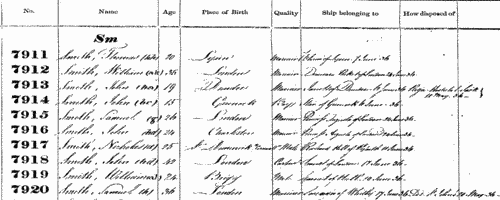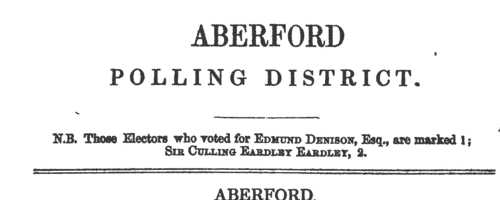Brier Surname Ancestry ResultsOur indexes 1000-1999 include entries for the spelling 'brier'. In the period you have requested, we have the following 72 records (displaying 11 to 20): Single Surname Subscription | | | Buying all 72 results of this search individually would cost £404.00. But you can have free access to all 72 records for a year, to view, to save and print, for £100. Save £304.00. More... |
These sample scans are from the original record. You will get scans of the full pages or articles where the surname you searched for has been found. Your web browser may prevent the sample windows from opening; in this case please change your browser settings to allow pop-up windows from this site.  British merchant seamen
(1835-1836) British merchant seamen
(1835-1836)
At this period, the foreign trade of ships plying to and from the British isles involved about 150,000 men on 15,000 ships; and the coasting trade about a quarter as many more. A large proportion of the seamen on these ships were British subjects, and so liable to be pressed for service in the Royal Navy; but there was no general register by which to identify them, so in 1835 parliament passed a Merchant Seamen's Registration Bill. Under this act this large register of British seamen was compiled, based on ships' crew lists gathered in British and Irish ports, and passed up to the registry in London. Each seaman was assigned a number, and the names were arranged in the register by first two letters of the surname (our sample scan shows one of the pages for 'Sm'); in addition, an attempt was made to separate out namesakes by giving the first instance of a name (a), the second (b), and so on. But no effective method was devised to prevent the same man being registered twice as he appeared in a second crew list; moreover, the original crew lists were clearly difficult for the registry clerks to copy, and some of the surname spellings appear to be corrupted. A parliamentary committee decided that the system devised did not answer the original problem, and this register was abandoned after less than two years: but it is an apparently comprehensive source for British merchant seamen in 1835 to 1836. The register records the number assigned to each man; his name; age; birthplace; quality (master, captain, mate, 2nd mate, mariner, seaman, fisherman, cook, carpenter, boy &c.); and the name and home port of his ship, with the date of the crew list (usually at the end of a voyage). Most of the men recorded were born in the British Isles, but not all (for instance, Charleston and Stockholm appear in the sample scan). The final column 'How disposed of' is rarely used, and indicates those instances where a man died, was discharged, or deserted his ship during the voyage.BRIER. Cost: £8.00.  | Sample scan, click to enlarge

| Dissolutions of Partnerships
(1836)
Trade partnerships dissolved, or the removal of one partner from a partnership of several traders, in England and Wales
BRIER. Cost: £6.00.  | Sample scan, click to enlarge

| Insolvents
(1838)
Insolvency notices for England and Wales: insolvency often caused people to restart their lives elsewhere, so these are an important source for lost linksBRIER. Cost: £6.00.  | Sample scan, click to enlarge

|  British merchant seamen
(1835-1840) British merchant seamen
(1835-1840)
At this period, the foreign trade of ships plying to and from the British isles involved about 150,000 men on 15,000 ships; and the coasting trade about a quarter as many more. A large proportion of the seamen on these ships were British subjects, and so liable to be pressed for service in the Royal Navy; but there was no general register by which to identify them, so in 1835 parliament passed a Merchant Seamen's Registration Bill. Under this act a large register of British seamen was compiled, based on ships' crew lists gathered in British and Irish ports, and passed up to the registry in London. A parliamentary committee decided that the system devised did not answer the original problem, and the original register was abandoned after less than two years: the system was then restarted in this form, with a systematic attempt to attribute the seamen's (ticket) numbers, and to record successive voyages. The register records the number assigned to each man; his name; age; birthplace; quality (S = seaman, &c.); and the name and official number of his ship, with the date of the crew list (usually at the end of a voyage). Most of the men recorded were born in the British Isles, but not all. The system was still very cumbersome, because the names were amassed merely under the first two letters of surname; an attempt was made to separate out namesakes by giving the first instance of a name (a), the second (b), and so on. During 1840 this series of ledgers was abandoned, and a new set started with names grouped together by surname. BT 112/8BRIER. Cost: £8.00.  | Sample scan, click to enlarge

| Insolvents
(1841)
Insolvency notices for England and Wales: insolvency often caused people to restart their lives elsewhere, so these are an important source for lost linksBRIER. Cost: £6.00.  | Sample scan, click to enlarge

|  Merchant Seamen
(1840-1844) Merchant Seamen
(1840-1844)
The Registry of Merchant Seamen, including fishermen, sought to identify individuals securely in this series of registers by assigning to each man a unique number, grouped together by surname, and then by christian name, whereas in previous registers names had been jumbled together under the first two letters of the surname. Each man's age and birthplace was recorded, together with any number brought forwards from previous registration, i. e. the number assigned to the man in the registers for 1835 to 1840. Then each voyage is listed, with his status (e. g. S for seaman, M for mate, &c.) on that trip, the identification number of the ship, the date, and then the name of the ship. In the event of it becoming known that a man had died during the course of a voyage, that information is written across the remaining empty columns. This volume (BT 112/9) covers mariners whose surnames start with Br (and McBr).BRIER. Cost: £8.00.  | Sample scan, click to enlarge

| Railway Subscription Contracts
(1845)
£21,386,703 6s 4d was promised by about 10,000 subscribers of less than £2,000 per contract to the nearly 200 railway bills deposited in the Private Bill Office during the Session of Parliament for 1845. This alphabetical list gives the full names of the subscribers (surname first), description (i. e., occupation), place of abode, a numerical reference to the title of the railway, the amount subscribed to each, and total. There is a separate key to the titles of the railways.BRIER. Cost: £4.00.  | Sample scan, click to enlarge

| Railway Subscription Contracts
(1846)
£121,255,374 0s 8d was promised by about 8,000 subscribers of more than £2,000 to the nearly 556 railway bills deposited in the Private Bill Office during the Session of Parliament for 1846. This alphabetical list gives the full names of the subscribers (surname first), description (i. e., occupation), place of abode, a numerical reference to the title of the railway, the amount subscribed to each, and total. There is a separate key to the titles of the railways.BRIER. Cost: £4.00.  | Sample scan, click to enlarge

| Bankrupts
(1848)
Bankruptcy notices for England and Wales: bankruptcy often caused people to restart their lives elsewhere, so these are an important source for lost links
BRIER. Cost: £6.00.  | Sample scan, click to enlarge

| Electors for Kirkheaton
(1848)
On 14 and 15 December 1848 an election took place for a Knight of the Shire for the West Riding of Yorkshire in the House of Commons. The candidates were Edmund Denison and sir Culling Eardley Eardley, gaining 14,743 and 11,795 votes respectively. The county franchise at this period included freeholders of land worth 40s or more a year; £10 copyholders and long-leaseholders; and £50 short-leaseholders and tenants. This poll book was published in 1849.
Former poll books had been compiled from the sheriff's returns; but as these were now transmitted to the Home Office immediately after an election, in this instance the polling was marked from the check-clerk's returns, carefully compared with the registers marked in the poll booths at the time of voting.
The votes for the respective candidates are indicated by the numerals 1 (Denison) and 2 (Eardley). The omission of these numerals indicates that the elector did not vote. Many names which appear on the register of particular townships are completely omitted in this poll book: in all these cases, the same name will be found recorded in some other township, the elector having two or more qualifications. In such cases, his name only appears in the poll book in the actual township for which he chose to vote; or, if he did not vote at all, in that township for which he was qualified that lay closest to his actual residence.
The townships are arranged alphabetically within polling district; and within each township the names are arranged alphabetically by surname and christian name, and the elector's residence is given. Many of the electors resided outside the township for which they were qualified - some in other counties. Moreover, at the end of each polling district there is a list of persons registered to poll in that district, from townships is other districts. BRIER. Cost: £6.00.  | Sample scan, click to enlarge

|
Research your ancestry, family history, genealogy and one-name study by direct access to original records and archives indexed by surname.
|













